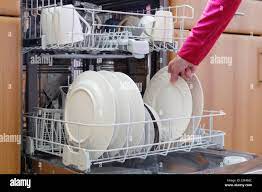Dishwashers stand as a cornerstone in modern kitchens, offering unparalleled convenience in cleaning up after meals. Yet, like all household appliances, they aren’t impervious to wear and tear. Understanding the lifespan of dishwashers and the myriad of factors influencing their longevity is crucial for homeowners looking to optimize their investment and ensure efficient, hassle-free kitchen maintenance.
The Dynamics of Dishwasher Longevity
Several factors interplay in determining the lifespan of a dishwasher:
Quality and Brand Reputation:
The adage “you get what you pay for” often holds true in the world of dishwashers. Renowned brands known for their quality craftsmanship and innovative technology tend to produce machines that last longer. High-quality materials and superior engineering contribute significantly to extended longevity.

Frequency and Type of Use:
The frequency and intensity of use impact a dishwasher’s lifespan. Daily usage may result in a shorter lifespan compared to intermittent use. Moreover, heavy-duty cycles and intense cleaning sessions might strain components, potentially affecting their durability.
Maintenance Habits:
Proper care and maintenance are paramount for extending a dishwasher’s life. Routine cleaning of filters, checking for blockages, and addressing minor issues promptly can prevent major malfunctions and prolong its functionality.
Water Quality:
The hardness and quality of water used in the dishwasher can significantly affect its lifespan. Hard water, containing minerals like calcium and magnesium, can lead to limescale buildup, potentially damaging internal parts over time.
The Average Lifespan of Dishwashers
Typically, a well-maintained dishwasher can endure between 9 to 15 years. However, this timespan can fluctuate significantly based on the aforementioned factors. High-end models with superior build quality and optimal maintenance can surpass this range, while cheaper models might fall short.
Signs Indicating Your Dishwasher Might Need Replacement
Decline in Performance: Inefficiencies in cleaning, such as residue or spots on dishes, may signal a deteriorating dishwasher.
Visible Deterioration:
Cracks, rust, leaks, or visible damage indicate wear and tear, potentially requiring a replacement.
Odd Noises:
Unusual sounds during operation might signify internal issues that warrant inspection or repair.
Strategies to Prolong Your Dishwasher’s Lifespan
Regular Maintenance: Consistent cleaning of filters, checking for blockages, and inspecting components can prevent potential malfunctions.
Using Appropriate Detergents: Opt for detergents specifically designed for dishwashers to prevent buildup and preserve internal components.
Mindful Loading: Avoid overloading the dishwasher and ensure dishes are correctly positioned to minimize strain on the machine.
Knowing When to Consider Replacement
When a dishwasher consistently exhibits issues, experiences a decline in performance, or reaches the latter part of its expected lifespan, replacing it might be a prudent decision. Upgrading to a newer, more energy-efficient model can not only enhance convenience but also contribute to long-term savings through reduced energy and water consumption.
Conclusion
The lifespan of a dishwasher isn’t solely predetermined but rather influenced by a combination of usage, maintenance, water quality, and build. Empowered with this knowledge, homeowners can adopt proactive measures to extend their dishwasher’s life and make informed decisions regarding repairs or replacements. By prioritizing regular maintenance and conscientious usage, one can maximize the longevity of this indispensable kitchen appliance, ensuring years of reliable service and convenience.


